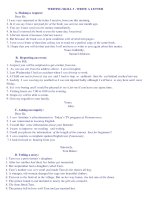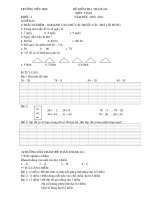ĐÁP ÁN IELTS WRITING THÁNG 6
Bạn đang xem bản rút gọn của tài liệu. Xem và tải ngay bản đầy đủ của tài liệu tại đây (1.03 MB, 19 trang )
REVIEW ĐỀ THI IELTS WRITING THÁNG 6/2019
BY NGOCBACH
07/06/2019
The chart below shows the number of jobs in tourism-related industries in one UK citiy between 1989 and
2009.
Summarise the information by selecting and reporting the main features and make comparison where
relevant.
Task 2: Giống đề 25042019
In many countries today, people in cities either live alone or in small family units,
rather than in large family groups. Is this a positive or negative trend?
+ Thông tin khóa học offline tháng 7/2019 của thầy Bach: />+ Thông tin khóa học online tháng 7/2019 của thầy Bach: />
1
Essay Plan:
Introduction: refer to the task question; opinion – the trend is equally
positive and negative
Paragraph 2: positive – lack of housing in cities, only small living spaces are
affordable, so people can afford decent accommodation only if they live alone
or in a small family unit
Paragraph 3: negative – (1) socially (2) financially – the benefits of living in a
large family are lost – example: loss of social contact, sharing expenses,
chores.
Conclusion: there are equal positive and negative aspects.
Essay:
It is true that in recent years, many urban dwellers have tended to live on their own or in
nuclear families. In my opinion, this trend has both positive and negative consequences
in equal measure.
On the one hand, the rise in smaller households is a positive trend primarily for
economic reasons. The migration of people from rural to urban areas has resulted in an
enormous increase in demand for housing. The housing stock has been inadequate to
cope with this demand, and so property developers have taken advantage of this
population shift to raise house prices and rents. They have built apartment blocks which
provide accommodation for only single people or small families. If they do not wish to
endure squalid housing conditions, therefore, it is clearly necessary for people to live
alone or in small, usually family, groups.
On the other hand, there are negative aspects of this trend. With the mass exodus of
people to cities, ties of kinship are broken as the extended family which lived together in
the countryside is broken up. Socially, family gatherings take place only rarely and,
financially, living costs can no longer be shared between many family members living
under the same roof. For example, grandparents or other relatives used to help with
household expenses, child-minding and cooking. Individuals rarely felt lonely or isolated,
experiencing a sense of alienation as they sometimes do in cities, without such family
support.
In conclusion, I believe that this trend has equally significant positive and negative
aspects for both social and financial reasons.
+ Thông tin khóa học offline tháng 7/2019 của thầy Bach: />+ Thông tin khóa học online tháng 7/2019 của thầy Bach: />
2
258 words
Vocabulary from cities:
urban dwellers
Meaning: people who live in a city or a town
Example: The main reason that prevents urban dwellers from building
relationships with their neighbours is fear of strangers.
the migration of people from rural to urban areas
Meaning: the movement of people from the countryside to cities
Example: In recent times, the migration of people from rural to urban areas
has dramatically increased, causing numerous problems.
the housing stock
Meaning: all the houses available for living in
Example: The inadequate housing stock in most cities has resulted in high rents,
overcrowded living conditions and the growth of slum areas.
to be inadequate to cope with
Meaning: not good enough to deal with a problem
Example: The rapid growth of cities has meant that urban infrastructure, such as
housing, water and waste disposal services have been inadequate to cope with
the demands of an increasing population.
population shift
Meaning: a change in the numbers of people who live in a particular area
Example: The last two centuries have seen a global population shift of people
from rural areas to cities.
to endure squalid living conditions
Meaning: very dirty and unpleasant conditions in which to live
Example: Newcomers to a city are often forced to endure squalid living
conditions.
+ Thông tin khóa học offline tháng 7/2019 của thầy Bach: />+ Thông tin khóa học online tháng 7/2019 của thầy Bach: />
3
a mass exodus
Meaning: the movement of a lot of people from a place
Example: Recently, there has been a mass exodus of workers from the villages to
the towns.
a sense of alienation
Meaning: the feeling that you have no connection with the people around you
Example: Unfortunately, urbanisation also creates a sense of alienation in people.
Vocabulary from family and children:
a nuclear family
Meaning: a family consisting of a father, mother and their children
Example: The nuclear family has replaced the extended family as the most
common form of family structure throughout the world.
ties of kinship
Meaning: the fact of being related in a family, with links of friendship and
assistance to other family members
Example: In the modern world, people are always moving to a new place to live,
and this has weakened traditional ties of kinship.
an extended family
Meaning: a family group with many members, including parents, children,
grandparents, aunts and uncles, cousins etc
Example: In the past, the extended family was a form of support when any
members were ill or suffered some misfortune.
a family gathering
Meaning: a meeting of family members for a particular purpose
Example: In traditional societies, family gatherings are common to celebrate
special occasions.
child-minding
+ Thông tin khóa học offline tháng 7/2019 của thầy Bach: />+ Thông tin khóa học online tháng 7/2019 của thầy Bach: />
4
Meaning: caring informally (not in schools) for children when parents are busy or
working
Example: Working mothers with very young children face the problem of
organising child-minding while they are away from home.
Vocabulary from housing and architecture:
a property developer
Meaning: a person who buys land or buildings, and then makes improvements in
order to sell them for more money
Example: City planning cannot be left in the hands of property developers, who
are only interested in making money.
apartment blocks
Meaning: large buildings with apartments on each floor.
Example: Having to live in an apartment block is now considered a normal part of
city life.
Other vocabulary:
tend (to/towards something) [verb]:
Meaning: to be likely to do something or to happen in a particular way
Example: When I’m tired, I tend to make mistakes.
to break up [phrasal verb]:
Meaning: to come to an end and go away in different directions
Example: After many difficulties in their relationship, the couple decided to break
up and live separate lives.
under the same roof [expression]:
Meaning: in the same building or house
Example: I find it impossible to live under the same roof as my brothers – they
are too noisy!
+ Thông tin khóa học offline tháng 7/2019 của thầy Bach: />+ Thông tin khóa học online tháng 7/2019 của thầy Bach: />
5
+ Thông tin khóa học offline tháng 7/2019 của thầy Bach: />+ Thông tin khóa học online tháng 7/2019 của thầy Bach: />
6
13/06/2019
The chart below shows the number of jobs in tourism-related industries in one UK
city between 1989 and 2009.
Summarise the information by selecting and reporting the main features and make
comparisons where relevant.
1800
n 1600
u
m 1400
b
e 1200
r
1000
o
f
Restaurants/Hotels
Sport & Leisure
800
Travel & Tourism
600
j
o
b
s
400
200
0
1989
1994
1999
2004
2009
Report Plan:
Paraphrase paragraph: shows>compares; the number of jobs>how many
jobs; between 1989 and 2009>from 1989 to 2009
Overview/summary paragraph: (1) there were more jobs in restaurants and
hotels than in the other sectors
Paragraph 3: report on some figures and describe trends for restaurants and
hotels
Paragraph 4: contrast some figures and describe trends for sport and leisure
+ Thông tin khóa học offline tháng 7/2019 của thầy Bach: />+ Thông tin khóa học online tháng 7/2019 của thầy Bach: />
7
Paragraph 5: contrast steady decline in the numbers of jobs for travel and
tourism
Report:
The bar chart compares how many jobs there were in a UK city in three industries related
to tourism from 1989 to 2009.
Overall, it is clear that there were more jobs in restaurants and hotels than in the other
categories throughout the period. There was a declining trend over the period in the
number of jobs in travel and tourism.
In the restaurant and hotel industry, the number of jobs increased from 1100 in 1989 to
reach a peak of 1600 in 2004. Numbers then fell slightly to 1580 in 2009.
In contrast, the number of jobs in sport and leisure remained fairly constant. From a
figure of 800 in 1989, the jobs total fluctuated slightly around this number, before falling
to 700 at the end of the period.
Finally, the figure for jobs in travel and tourism rose from 780 to 830 from 1989 to
1994. However, this number declined to 630 and then 600 in 1999 and 2004,
respectively. By 2009, the number of jobs in this sector had decreased to just 400.
176 words
Task 2: Giống đề 25/04/2019
18/06/2019
The chart below shows the spending on health in various countries in 2002.
Summarise the information by selecting and reporting the main features and make
comparisons where relevant.
+ Thông tin khóa học offline tháng 7/2019 của thầy Bach: />+ Thông tin khóa học online tháng 7/2019 của thầy Bach: />
8
Report Plan:
Paraphrase paragraph: shows>compares; spending>expenditure; various
countries>five different countries
Overview/summary paragraph: (1) total spending was highest in the US (2) it
was lowest in Japan
Paragraph 3: compare total spent in all the countries; compare public and
private spending – give more detail on Japan, Italy and Germany
Paragraph 4: compare public and private spending (1) in Japan and the US
(2) in Germany, France and the US
Report:
The bar chart compares the expenditure on health in five different countries in 2002.
Overall, it is clear that total health spending was highest in the US, while Japan spent the
least on health.
In Italy, France and Germany the total amount spent on health was similar, whereas the
US spent significantly more on health, and in Japan the figure was significantly lower.
Public health expenditure was higher than private spending in all the countries, with the
exception of the US, which spent more private than public money on health. However,
although there was little difference in the amount of private and public money spent on
+ Thông tin khóa học offline tháng 7/2019 của thầy Bach: />+ Thông tin khóa học online tháng 7/2019 của thầy Bach: />
9
health in Japan and Italy, Germany spent almost twice as much public money on health
compared with private money.
Comparing Japan and the US in terms of how much private money was spent on health,
the amount spent in Japan was only about half that of US private health spending. In
contrast, Germany and France both exceeded US public expenditure on health in that
year.
171 words
Many people disagree with a school policy which forces children to learn new
languages. To what extent do you agree or disagree?
Essay Plan:
Introduction: refer to the task question; opinion – learning a new language is
valuable but should not be compulsory
Paragraph 2: benefits of language learning: (1) exchange or school visits to
other countries – children travel, learn social skills, have fun (2) a new
language can help in finding a job later
Paragraph 3: problems of compulsory language learning: (1) some children
might not think it useful and disrupt lessons (2) in a full school timetable,
children may give priority to essential subjects like science or maths
Conclusion: it is useful to learn a new language, but it should not be made
compulsory.
Essay:
It is true that many people oppose the idea that learning a foreign language should be
compulsory in schools. While it could be argued that learning a new language is
valuable in schools, I believe that such a policy should not be made compulsory.
On the one hand, it is advantageous for schoolchildren to study a foreign language. One
reason is that in some schools there are opportunities to participate in organised
+ Thông tin khóa học offline tháng 7/2019 của thầy Bach: />+ Thông tin khóa học online tháng 7/2019 của thầy Bach: />
10
exchange visits with overseas students, or to travel on school trips to countries with a
different language and culture. In these ways, children can assimilate knowledge and
even acquire social skills while having fun at the same time. Another reason is that if
children are able to speak a foreign language, they may find this useful in later life. It
could improve their job prospects and help them to pursue a successful career.
On the other hand, I would argue that children should not be forced to learn a new
language. Firstly, some children might fail to see the point of studying a subject, for
example French or German, which they think they will never use. They would soon
become bored and disrupt lessons. Secondly, the school curriculum may already cover a
lot of ground. Given a busy timetable, pupils may prefer to study things which they think
will benefit them in the future, such as science or mathematics.
In conclusion, although learning a new language would be useful, fun and challenging
for children, I feel that this should not form a compulsory part of the school curriculum.
260 words
Vocabulary from communication and personality:
to assimilate knowledge
Meaning: to absorb and understand knowledge
Example: Some people claim that children assimilate knowledge more easily than adults,
citing studies into the way that young children learn.
to have social skills
Meaning: to have the personal skills required for successful communication and interaction
Example: In all jobs which involve dealing with the public, it is important to have good
social skills.
Vocabulary from work:
job prospects
Meaning: the chances of being successful and having more opportunities at work
Example: People with qualifications and experience usually have the best job prospects.
+ Thông tin khóa học offline tháng 7/2019 của thầy Bach: />+ Thông tin khóa học online tháng 7/2019 của thầy Bach: />
11
to pursue a successful career
Meaning: to have a series of jobs in a particular area of work, with more responsibility as
time passes
Example: While many people wish to pursue a successful career, for others it is more
important to find work which is interesting and enjoyable.
Vocabulary from education:
to disrupt lessons
Meaning: to make it difficult to conduct the lesson in the normal way
Example: If strict discipline is not imposed on pupils who disrupt lessons, then the
education of all the children in the school will suffer.
to cover a lot of ground
Meaning: to deal with much information and many facts.
Example: The history lecture covered a lot of ground today.
Other vocabulary:
advantageous [adjective]:
Meaning: good or useful in a particular situation
Example: Lower fares on trains make it advantageous to travel after 9:00 a.m.
to see the point of [expression]:
Meaning: to understand the purpose or aim of something
Example: I don’t see the point of studying French, because soon the whole world will
speak English or Chinese.
+ Thông tin khóa học offline tháng 7/2019 của thầy Bach: />+ Thông tin khóa học online tháng 7/2019 của thầy Bach: />
12
20/06/2019
The diagrams show total global population between 1900 and 2000, and its
proportions according to region.
Global population from 1900 to 2000
8
B
6
i
l n
4
l s
2
i
o
0
1900 1910 1920 1930 1940 1950 1960 1970 1980 1990 2000
+ Thông tin khóa học offline tháng 7/2019 của thầy Bach: />+ Thông tin khóa học online tháng 7/2019 của thầy Bach: />
13
Report Plan:
Paraphrase paragraph: (make one sentence for each type of diagram):
show>give information about/illustrate; global>world;
proportion>percentage
Overview/summary: (1) line graph – world population increased rapidly after
1970 (2) pie charts – the region with the highest proportion was Asia
Paragraph 3: report figures and trends for world population (line graph)
Paragraph 4: report figures and changes for the two largest regions (Asia and
Europe)
Paragraph 5: contrast figures and trends for the other regions.
Report:
The line graph gives information about total world population from 1900 to 2000. The
pie charts illustrate the percentage of the world population in this period in terms of
regions.
Overall, it is clear that global population rose dramatically after 1970. The region with
the highest proportion of people in the world was Asia.
From 1.6 billion in 1900, the world population fluctuated until 1950. It then increased
significantly, reaching 3 billion in 1980 and doubling to 6 billion by 2000.
According to the pie charts, 60% of global population lived in Asia in 1900, although
this fell to 54% at the end of the period. The proportion of global population also fell in
Europe (including Russia) from 25% in 1900 to 14% in 2000.
By contrast, in Africa the proportion of world population over the period more than
doubled to reach 10%. There was a similar increase in Latin America, from 3% in 1900
to 8% in 2000. The proportion of global population in North America and ‘Others’
remained constant at 5% and 3%, respectively. Finally, a new region is shown in the
chart for 2000, the Middle East with 6% of world population.
195 words
+ Thông tin khóa học offline tháng 7/2019 của thầy Bach: />+ Thông tin khóa học online tháng 7/2019 của thầy Bach: />
14
Government should invest in teaching science subjects rather than other subjects in order
for a country to develop and progress . To what extent do you agree or disagree?
Essay Plan:
Introduction: refer to the essay question; own opinion – science subjects are
important, but other subjects are important too.
Paragraph 2: arguments for investing in science education. Students must
have a good knowledge of science and recent technological breakthroughs –
e.g. genetics and medicine. They can then contribute to the development of
scientific knowledge
Paragraph 3: other subjects are important. Progress is not economic growth.
(1) develop creative talents – study of art, music, literature (2) develop critical
skills – study of history, philosophy, languages
Conclusion: investing in science subjects is important, but investing in other
subjects is also necessary.
Essay:
It is true that investment in science education in schools and universities should be high
on the agenda of all governments. However, while this is important, I disagree that this
should be the only priority, because it is also important to allocate resources to the
teaching of other subjects.
It is clearly essential to provide funding for the study of science subjects. Recent
discoveries in science have been applied to bring about changes in such fields as health,
food production and, above all, communications. For example, genetics based on the
research of biologists is revolutionising the treatment of diseases such as cancer.
Therefore, governments must invest heavily in science subjects in order to ensure that the
knowledge of science graduates is up-to-date. If this is done, the international scientific
community will, for instance, be able to find solutions to pressing environmental
challenges facing the world today.
However, government investment in science education must not be at the expense of
neglecting other subjects. Progress and development do not mean economic growth.
Firstly, schools should encourage students to express themselves through art, literature
and music and develop those talents which are a part of our cultural life. Secondly, if it
+ Thông tin khóa học offline tháng 7/2019 của thầy Bach: />+ Thông tin khóa học online tháng 7/2019 của thầy Bach: />
15
were not for the study of subjects such as history, philosophy and languages, then nobody
would be able to see the big picture. Ethical social questions concerning how people
might live in harmony with one another in a sustainable way would never be discussed.
In conclusion, it is necessary for governments to invest in science education, but they
must also promote the study of other subjects to develop the creativity and critical
thinking of students.
273 words
Vocabulary from government:
high on the agenda
Meaning: something which is among the first things in the list of actions to be taken
Example: The rehabilitation of prisoners must be high on the agenda of prison
authorities everywhere.
to allocate resources to
Meaning: to make money and materials available to do something
Example: If governments allocate more resources to improving public transport,
this will reduce the problem of traffic congestion in cities.
to provide funding for
Meaning: to give money to enable something to be done
Example: Providing funding for health care must be a priority of governments.
Vocabulary from technology:
to apply something to something
Meaning: to use something or make something work in a particular situation
Example: The new technology applied to farming has led to a huge reduction in
the agricultural workforce.
Vocabulary from the arts:
to express oneself
Meaning: to communicate some idea or emotion through speech, writing, painting,
music or some other form of art
+ Thông tin khóa học offline tháng 7/2019 của thầy Bach: />+ Thông tin khóa học online tháng 7/2019 của thầy Bach: />
16
Example: Schools should encourage pupils to express themselves through art,
music or creative writing in order to stimulate their imagination.
Vocabulary from communication and personality:
to see the big picture
Meaning: to understand all the important aspects of a situation
Example: Students sometimes get confused with so many details to remember,
but our history teacher is able to make us see the big picture.
to live in harmony with one another
Meaning: to live with others in a way which avoids conflict or disagreement
Example: The students who share the house are all good friends and they are
able to live in harmony with one another.
Other vocabulary:
to revolutionise/revolutionize [verb]:
Meaning: to completely change the way that something is done.
Example: Computers have revolutionised the way that people communicate and
study.
up-to-date [adjective]:
Meaning: modern, fashionable
Example: Her new i-Phone has the latest up-to-date features.
pressing [adjective]:
Meaning: needing to be dealt with immediately
Example: I left the meeting because I had some pressing business to attend to.
to neglect [verb]:
Meaning: to not give enough attention to something
Example: He neglected his studies, so it is no surprise that he failed the exam.
22/06/2019
+ Thông tin khóa học offline tháng 7/2019 của thầy Bach: />+ Thông tin khóa học online tháng 7/2019 của thầy Bach: />
17
Report Plan:
Paraphrase paragraph: shows>illustrates; the number of>how many;
complete>finish
Overview/summary paragraph: (1) most students completed their
dissertations on time (2) the number of students who failed to complete fell
Paragraph 3: give figures and compare trends for how many students
completed their dissertations (on time or late)
Paragraph 4: contrast the downward trend for students who failed to
complete their dissertations. Report on fluctuations of the number of
students who rewrote.
Report:
The bar chart illustrates how many students in a UK university finished or failed to finish
their dissertations on time in the years 1990, 2000 and 2010.
+ Thông tin khóa học offline tháng 7/2019 của thầy Bach: />+ Thông tin khóa học online tháng 7/2019 của thầy Bach: />
18
Overall, it is clear that in each of the years, most students completed their dissertations
punctually. The number who failed to write fell steadily over the years shown.
In 1990, a total of 150 students finished their dissertations on time, and this number
increased to 200 and 300 in 2000 and 2010, respectively. There was a similar trend in
the numbers who completed their dissertations late. From a figure of about 20 in 1990,
the number rose to 30 in 2000 and then to almost 50 in 2010.
By contrast, there was a decrease in the number of those who failed to write their
dissertations. This figure stood at almost 50 in 1990, falling by half in 2000 and then
declining again to below 10 in 2010. Finally, the number of those who rewrote their
dissertation fluctuated, from around 5 in 1990, rising to 30 in 2000 and then decreasing to
25 by 2010.
181 words
Many museums and historical sites are mainly visited by tourists but not local people.
Why is this the case and what can be done to attract more local people to visit these places?
SAMPLE ANSWER:
It is true that tourists from many parts of the world pay more visits to museums and historical
places than local inhabitants. Resulting from a number of reasons, this situation should be solved
by attracting the locals in some practical ways.
There are two main reasons why museums and historical sites are preferred more by tourists than
by local residents. One reason is that museums are too familiar to nearby inhabitants. If museums
do not change anything, there will be nothing new for the locals to discover. Like eating the same
dish every single day, they feel bored with visiting the same places. Furthermore, entrance tickets
at some historical sites are expensive for the local inhabitants to afford. For example, in Dien Bien,
a province in northwestern Vietnam, it is rather hard for the residents to make ends meet (xoay
sở đủ sống), let alone to spend money on visiting some famous historical attractions there.
The governments should take some measures/steps to tackle this issue effectively. Firstly,
museums ought to be invested in more by the authorities to refresh the exhibits . The fresher the
museums are, the more local residents are interested in them. Secondly, historical relics need to be
free for all the local people. Without worrying about additional expenditure, those residents will
pay more and more visits to historical sites in order to broaden their knowledge about their home
towns.
In conclusion, there are some evident reasons that bring about this trend. However, something
should be done to attract more visits of the locals by the authorities
+ Thông tin khóa học offline tháng 7/2019 của thầy Bach: />+ Thông tin khóa học online tháng 7/2019 của thầy Bach: />
19









